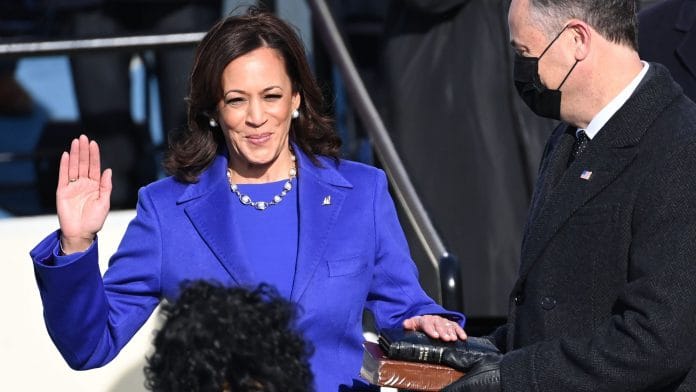For more than 50 years, the economics profession has sought to increase the number of Black people and women in its ranks. But one event might achieve as much for the intersection of those groups — Black women — as any of the best-intentioned initiatives: the emergence of Kamala Harris as vice president of these fractured United States.
When Harris took the oath of office, millions witnessed the shattering of the glass ceiling that has kept Black women out of the country’s highest offices — including, potentially, the presidency. (By emphasizing the vice president’s blackness, I do not mean to erase her South Asian heritage. I’m simply acknowledging that many Americans will see her as Black.)
In 1986, when Harris graduated from Howard University with a bachelor’s degree in economics, women represented only 34% of the recipients of such degrees. Unfortunately, the data on women for that year are not broken further down by race and ethnicity — reflecting the flawed assumption that gender operates the same across different races (and that race operates the same across genders).
More recent disaggregated data illustrate just how far Black women are being left behind.
There’s also a growing gender gap among Black degree recipients.
There’s been a lot of talk about how toxic the economics profession is for female graduate students and faculty. Yet with the exception of the American Economic Association’s climate survey, which asks people about incidents of discrimination and harassment, such conversations do not consider the specific experiences of Asian, Black or Hispanic women. Doctorate-level Native American economists are so rare that even the climate survey does not include them.
So how will Harris help? For one, women who aspire to be like Harris — especially Black and Asian women — will take economics courses, hopefully from professors who include race and inequality in their lectures and who inform all students about career opportunities.
Also, Harris’s success will attract more attention to Howard University, where she studied. Howard will be the first historically Black institution to host the American Economic Association Summer Training Program, welcoming its first cohort of students this summer. It’s already the No. 1 producer of Black graduates who go on to complete a doctorate in economics.
Finally, Harris’s biracial heritage might inspire those interested in increasing diversity to rethink how data are analyzed. I hope this will encourage more disaggregation, to help identify the factors that influence outcomes and craft more tailored and effective policies.
I don’t want to overstate what one person can do. The election of a Black and South Asian woman as vice president doesn’t mean the economics profession should relax its other efforts to become more diverse. On the contrary, it should redouble them. That said, examples can be powerful. Let’s hope Harris’s will be so.- Bloomberg
Also read: How Joe Biden and Kamala Harris could transform American childhood






